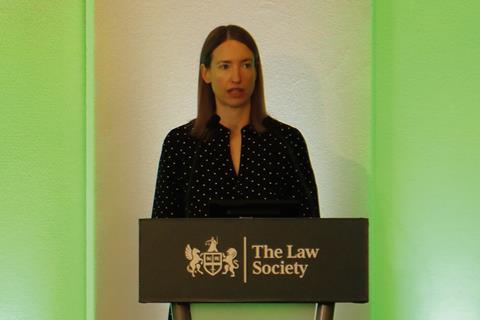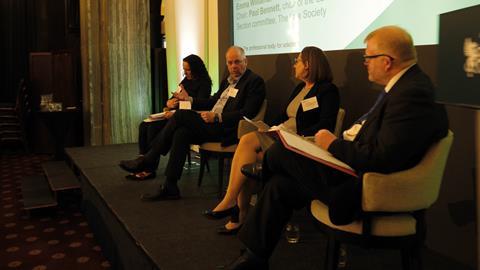Highlights and pointers from this year's annual risk and compliance conference
‘Good’ and ‘bad’ firms – a looming dystopia?
Will the profession soon be populated by ‘good’ law firms that act only for clients deemed morally sound, and ‘bad’ law firms willing to pick up the pariahs?
That was among the highly topical questions posed at the Law Society’s annual risk and compliance conference, held at Chancery Lane on 25 March. It came in the context of the breakneck speed with which City giants have dropped Russian clients in the wake of the Ukraine invasion. Could such a divide also come to apply in areas such as climate change and acting for the producers of fossil fuels?
Iain Miller, partner and legal services regulation specialist at Kingsley Napley, believes the profession has got itself into a ‘mess’ by prioritising compliance ‘box-ticking’ ahead of ethics.
‘The easiest thing for a law firm to do [would be] to stop acting for oil companies, cigarette companies, gambling companies. And yet, I think probably a lot of us in this room would think that just doesn’t feel right.
‘Quite a lot of what are currently oil companies are moving to become energy companies and will ultimately derive their income from renewables. Therefore the difficult but right role of lawyers is to serve the economy and to do it in an ethical way in accordance with all of our requirements.
‘The problem we’re facing is that this may not be where public opinion is. How are we going to square that circle?’
Miller believes the profession needs to be ‘more aggressive’ in explaining its role in society, ‘coming back to the ethical principles that guide us’.
He added: ‘We don’t teach ethics in English universities and conversion courses. We teach risk and compliance. And somehow we got ourselves into a mess 30 or 40 years ago, where we decided risk and compliance – the ticking of the boxes – was all we ever needed to know as lawyers. We didn’t need to know about the ethical principles. America, Canada, every other common law country has an entirely different view.
‘So with some types of issues none of us are armed with the tools to analyse them. We do need to dial up our ethical understanding. It’s a difficult time to be a lawyer.’
The same plenary session, on future compliance challenges, also touched on the SRA’s new guidance on workplace ‘culture’ and the risks of failing to protect and support employees in their jobs.
As one speaker put it, so-called ‘ogre’ partners who mistreat colleagues will no longer be tolerated just because they are a top rainmaker.
Emma Williams, head of risk & compliance at Morgan Lewis, said: ‘This is a big change – introducing a new rule is not something that often happens in the code [of conduct]. But actually when you read the text of [the SRA guidance], it’s hard to think that any firm would have a problem with it in respect of partners, associates, trainees, managers. It’s something we all have to be comfortable with nowadays. And I think that’s global.’
Hybrid working
We all went to electronic working during the pandemic and saved a significant six-figure sum on paper. We don’t want to lose that – we don’t want to go back, we want to keep the technology.
The real challenge now is how do you maintain the culture of the office when that culture was previously driven by, in our case, about 80% of the people being in an office 80% of the time? What we are now asking people to do, in line with what the market seems to be doing, is to come into an office at least two days a week. And we are encouraging team managers to work out for themselves how that is going to work best for their teams. Because their teams will have to sort out childcare again, they will have to sort out that puppy-walker for the dog that they bought in lockdown. All that kind of stuff.
And how are you going to manage that? Because there’s no point coming back into the office to discover none of your team are in there. The whole point of being in the office is to replicate those interactions. I am very sceptical of learning by osmosis but there is something [in the fact that] where people are with people, they see how people behave. They can do the swivel-chair movements and there is something about being in an office. Without that, you lose the chats before meetings, the chats after meetings, meeting people who are part of your team. One of the things we found in the pandemic is teams spent a lot more time talking to each other, but much less time talking to other teams in other areas.
So really, we’re all [in the profession] pretty much making this up as we go along.
Stuart Whittle, partner, Weightmans
Sanctioned clients
The Solicitors Regulation Authority is preparing to launch a ‘thematic review’ of financial sanctions. This will produce a report by the autumn with the aim of providing guidance to lawyers who may find themselves exposed in this area in the wake of Russia’s invasion of Ukraine.
Colette Best, the regulator’s director of anti-money laundering, announced the initiative last week at the Law Society’s first in-person annual risk and compliance conference for two years.
‘It’s incredible just how quickly this has become one of our key priorities,’ Best told a plenary session updating delegates on anti-money laundering initiatives.
‘In reacting to the fairly horrific and unique situation that’s going on in the world we have done a number of checks in this area,’ she said. ‘That has been very reactive to some of the commentary and discourse that has happened in parliament, but also active in doing some checking of firms’ lists, where we have seen that firms do have exposure to Russian markets.’

It is understood the review will look at the role of lawyers who have worked for sanctioned clients, speaking to a large sample size and sharing lessons and findings.
She added: ‘The aim [of our thematic review] would be to get some helpful guidance [to put] in the context of legal services in a way that helps you comply.’
Best urged firms to keep up to date with the frequent announcements of the Office of Financial Sanctions Implementation and do ongoing checks when new clients are onboarded.
On a related topic, Best noted that in the last year the regulator has devoted more resources to detecting and preventing money laundering. ‘The number of desk-based reviews and unfortunately the number of investigations that we are doing in the AML space have increased,’ she said. ‘That does mean that the chances of your firm being visited are increasing.’
A ‘very small minority’ of firms are making ‘little or no effort’ in this area, she added, while a number are ‘struggling with the fundamentals.
‘Size of firm is not a good proxy for good outcomes in preventing money laundering,’ she stressed. ‘We see lots of good practice among small firms and sole practitioners as well as large firms.’
One relatively common shortcoming highlighted by Best is employee screening, where 49 of 69 firms visited by the regulator were given feedback. ‘It can be as simple as Googling someone and checking adverse findings,’ she said. ‘And making sure that people know they should declare criminal convictions and CCJs to you.’
Comparison sites could ‘shut out’ small firms and BME solicitors
Small firms could be shut out of the market and clients may end up paying more if regulators press ahead with moves to compel solicitors to appear on digital comparison sites. Black and minority ethnic solicitors, a disproportionate number of whom work in sole practices or small firms, could also be seriously disadvantaged.
So warned Law Society vice president Lubna Shuja, who chaired a session on quality indicators and comparison sites. A policy statement is expected soon from the Legal Services Board on ‘empowering’ consumers to choose legal services providers.
Last year the SRA launched a pilot study on digital comparison tools, focusing on conveyancing and employment. Some 70 law firms and 10 sites, including TrustPilot, have taken part. This followed a 2020 Competition and Markets Authority review of its five-year-old market study of legal services, which found a mixed picture on consumer engagement. The CMA asked the LSB to take the lead on boosting quality and transparency.
‘At the Society we agree consumers should be able to access information on [the quality of customer service] and other objective regulatory data,’ said Shuja. ‘However, it is difficult to develop meaningful benchmarks across a diverse range of practice areas that provide a snapshot of what quality service should look like across the whole sector.’
Shuja pointed to the damage that can be done by fake reviews and the ‘warped picture’ that can emerge when data is inconsistent across practice areas. ‘For example, success rates in divorce or litigation are dependent on underlying factors which are often outside the control of the solicitor. With wills and trusts work, how do we clarify what success looks like? Similarly, complaints to [the ombudsman] tend to be more related to conveyancing, and estate agents have an interest because they refer to solicitors and often use preferred panels. This could have a knock-on effect on lawyers not taking on certain areas of law or difficult cases. And that in turn could impact on access to justice.
‘In other markets, top comparison tools put commercial conditions on suppliers that can lead to higher costs. Larger firms could end up monopolising these sites, shutting smaller firms out of the market and leading to an increase in prices, less choice and adverse impacts on access to justice. The Society cautions against mandatory signposting through digital comparison tools. Regulators must ensure they operate fairly and that consumers, firms and practitioners alike have trust and confidence in them.’
Shuja also stressed that new transparency measures ‘must not be onerous’ for smaller firms and sole practitioners. ‘Some 35% of sole practitioners and 22% of partners in smaller firms are from black, Asian or minority ethnic backgrounds. They already face a disproportionate number of regulatory referrals. They are also more likely to be serving challenging communities in higher areas of deprivation. So there is a real diversity angle here too.’
































1 Reader's comment